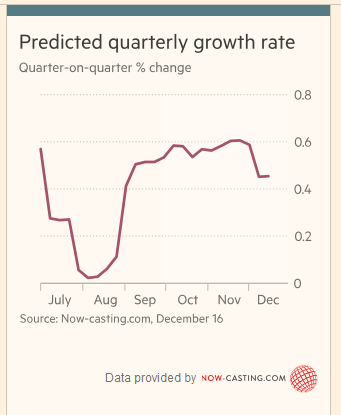MIA: The UK’s Brexit Recession
It was a sure thing, a done deal, a safe bet. Or so we were told. But certainty that the UK would slide into a recession after voting in June to leave the European Union has, so far, turned out to be one more botched recession forecast. But all’s not lost since the erroneous prediction offers another teachable moment for reviewing best practices for analyzing the business cycle.
Let’s start with today’s revised third-quarter GDP report for Britain. The Office for National Statistics (ONS) reports that growth was a bit stronger than previously estimated—output expanded 0.6% in Q3, matching Q2’s pace. “Robust consumer demand continued to help the UK grow steadily in the third quarter of 2016,” notes ONS statistician Darren Morgan. “Growth was slightly stronger than first thought, though, due to greater output in the financial sector.”
Indeed, there was no shortage of dark forecasts following the Brexit vote in June. A month later, the die was supposedly cast when PMI survey data published by IHS Markit reflected sharply weaker readings. The weak data are “consistent with GDP contraction,” advised the Economist Intelligence Unit’s Danielle Haralambous in July.
Many analysts agreed, fueling the widespread belief that a new recession was fate. “The PMI data for July released today point to a sharp drop in economic activity,” said Kallum Pickering, senior UK economist at Berenberg. “The risk of a recession in [the second half of] 2016 is significant.”
Why did the UK recession forecast crash and burn? A key part of the answer is bound up with embracing survey data as infallible for capturing the true macro trend. PMI figures are useful, but these numbers are no substitute for hard economic data. The great virtue of PMI survey reports: they arrive well ahead of the official releases. But as I’ve discussed, survey based economic indicators can be misleading, particularly when used in isolation. To the extent that you monitor PMIs—and you should—do so only in context with a broad review of economic data for nowcasting the macro trend.
Consider, for example, Now-casting.com’s growth estimates for the UK in recent months via the FT – estimates that draw on a wide range of hard and soft data. The real-time figures directly following the Brexit vote pointed to a sharp slowdown in growth in the July and August estimates. But note that the nowcasts remained positive, if only just barely. The estimates rebounded in September and remain firmly in positive territory. The current UK nowcast for Q4: a solid 0.46%.

So, what have we learned? First, don’t let emotions dominate economic analysis. That was a high bar immediately following Brexit, which shocked the world. But there was never much hard data in support of a UK recession forecast.
That brings us to the second lesson: reliable estimates of recession risk arrive with a lag.
To the extent we can model the business cycle, there’s always going to be a tradeoff between reliability and timeliness. A dependable system for estimating recession risk in the best-case scenario will signal downturns after the fact. That’s still useful from an investment perspective, but only if there’s a robust modeling effort producing the signals.
In other words, the recession forecasts that immediately followed the Brexit vote were less about solid econometric analysis than emotional reactions to a shocking political event. It all sounded reasonable at the time, but warning that a new downturn was fate was largely a function of letting fear outmaneuver objective analysis.
Where does that leave us? Well, a recession in the UK can’t be ruled out, even now. Brexit did change the macro climate for Britain. The problem is that no one’s really sure how this unprecedented event will play out.
The good news is that if there’s trouble brewing, we’ll see it in the incoming data. But reliable signals take time. If, for instance, a recession starts today, we won’t see confirming evidence for 2-3 months at the earliest.
Disclosure: None.



